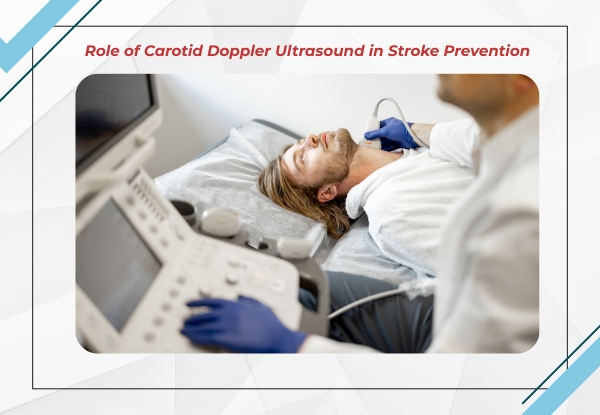
Stroke is one of the leading causes of disability and death in India, especially among older adults and those with lifestyle-related health issues. Many of these strokes are preventable when underlying conditions are identified early. One effective way to assess risk is through a carotid Doppler ultrasound, which can reveal artery issues before symptoms appear. This non-invasive imaging technique offers a clear look at the carotid arteries to help reduce the likelihood of stroke.
What is a Carotid Doppler Ultrasound?

A carotid Doppler ultrasound is a diagnostic procedure that examines the blood flow via the neck’s carotid arteries using sound waves. The brain receives oxygen-rich blood from these arteries. When plaque builds up inside them, a condition known as carotid artery disease, it can reduce or block blood flow and increase the chance of a stroke.
This test helps detect:
- Narrowing or blockages in the carotid arteries
- Blood clots
- Abnormal blood flow patterns
- Hardening of the arteries
The scan is painless, safe, and usually completed in less than half an hour without using needles, dyes, or radiation.
Why is Stroke Prevention Important?

Stroke continues to be one of the most prevalent and devastating illnesses in the world. It can cause long-term disability, affect independence, and, in severe cases, be life-threatening. The risk of stroke often increases due to lifestyle-related factors and underlying health conditions, many of which can be managed with early medical attention.
Common risk factors that make stroke prevention important:
- High blood pressure
- Smoking
- High cholesterol
- Diabetes
- Family history of stroke
Preventive health checks like carotid Doppler ultrasound help detect issues with blood flow to the brain before symptoms develop. By identifying and addressing these risks early, individuals can significantly reduce their chances of having a stroke.
How Does Carotid Doppler Ultrasound Help in Stroke Prevention?

The capacity of carotid Doppler ultrasound to identify blockages or decreased blood flow in the arteries supplying blood to the brain is what makes it useful in preventing strokes. With early identification of these issues, medical professionals can act before a stroke occurs.
Benefits of this test include:
- Identifying early signs of carotid artery disease
- Assessing the extent of artery narrowing
- Guiding decisions on medical or surgical treatment
- Monitoring progress in high-risk patients
In cases where severe blockage is detected, treatments such as medication or surgery may be recommended to improve blood flow and lower stroke risk.
What to Expect During the Test
People often delay medical tests due to fear or discomfort, but a carotid Doppler ultrasound is non-invasive and straightforward.
Here’s what typically happens:
- You lie on your back on an examination table
- A clear gel is applied to your neck
- A handheld probe (called a transducer) is gently moved over the skin
- Real-time images appear on a screen for the technician to examine
There is no recovery time required, and you can return to normal activities right away.
Who Should Get This Test Done?
Your doctor may suggest this test if you:
- Experience dizziness, blurry vision, or brief speech loss
- Have a personal or family history of stroke
- Are over 60 years of age
- Smoke or have diabetes, high cholesterol, or hypertension
For those in the western suburbs of Mumbai, the best diagnostic center in Vasai, such as Midas Care Clinic, offers accurate testing with trained specialists in carotid Doppler ultrasound.
Where to Get a Carotid Doppler Ultrasound
There are many well-equipped diagnostic centres offering carotid Doppler radiology services. If you live near Vasai, Midas Care Clinic is known for its well-trained staff and reliable reporting.
When choosing a diagnostic centre, look for:
- Certified and experienced technicians
- Up-to-date ultrasound equipment
- Centres that offer clear communication and timely results
Choosing the right centre can make a significant difference in diagnosis and ongoing care.
FAQs
Q1: Is a carotid Doppler ultrasound painful?
Answer: No, it is non-invasive and painless. Most people feel only light pressure from the probe.
Q2: How long does the test take?
Answer: The entire procedure usually lasts 20 to 30 minutes.
Q3: Do I need to prepare before the scan?
Answer: No special preparation is needed. You may be asked to avoid wearing jewellery or tight collars.
Q4: Is this test safe for elderly patients?
Answer: Yes, it is safe and often used to monitor those aged 60 and above.
Q5: Should I have this test more than once?
Answer: If you’re at high risk or have already had a stroke, your doctor may advise regular monitoring.
Conclusion
Understanding the role of carotid Doppler ultrasound in stroke prevention can help you take better control of your health. This test is simple, safe, and effective in identifying problems with blood flow before they lead to serious outcomes.
If you or someone you know has risk factors for stroke, speak to a healthcare professional about whether a carotid Doppler ultrasound is suitable. Early detection could be a vital step toward protecting long-term brain and heart health.

